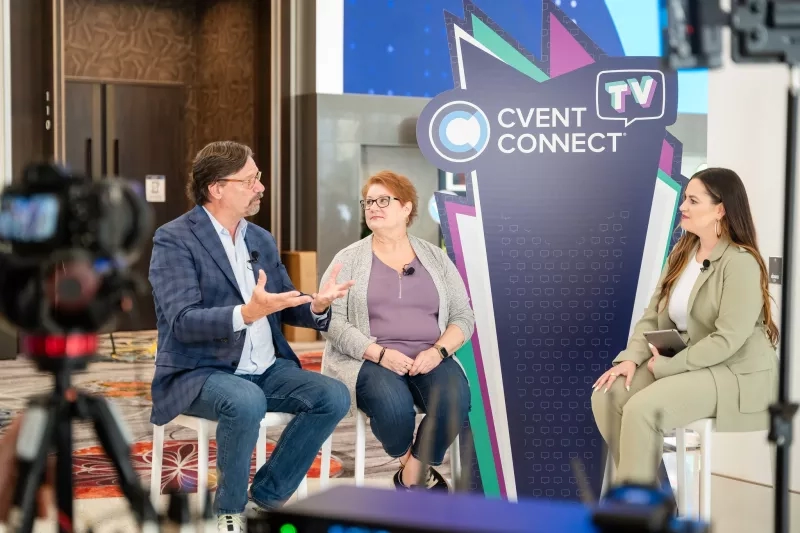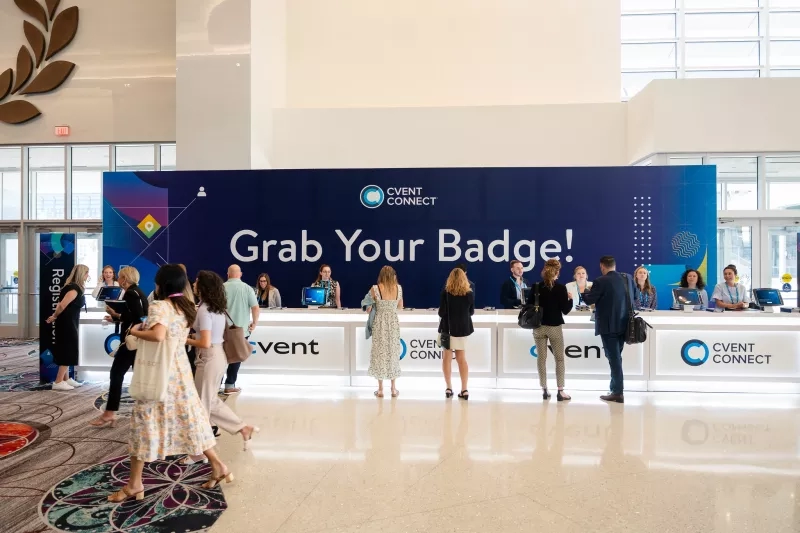
Events are a significant investment. But how do you know if that spending is paying off?
Event ROI. It’s about setting measurable goals and evaluating data to maximize your event’s impact and value.
In this post, I’ll explore the critical questions surrounding event ROI: Why calculate event ROI? What metrics matter most? How can technology like event planner software solutions boost outcomes?
With strategic goal setting and measurement, your next event can deliver tangible ROI, not just expenses. After reading this blog, you’ll be better equipped to achieve event success you can quantify! (You’re welcome, stakeholders!)
What Is Event ROI?
Event ROI is what you gain from hosting an event compared to what you spend on it. Think of it like this:
You throw a party (your event) and spend money on food, music, and decorations. At the end of the day, if your guests had a great time, made memories, or maybe even did some business deals with you, you've got some good returns on your party investment.
It’s the same in the event world, except the cost and benefits (value) are slightly different.
Value Factors in Event ROI:
- Event revenue: Typically, this comes from ticket sales or registration fees.
- Lead generation: New potential customers or clients identified during the event.
- Pipeline value: Potential business deals that arise as a result of the event.
- Number of attendees: A larger audience usually signifies greater reach, influence, and ticket sales.
- Sponsorships and partnerships: Collaborations that can offset costs or offer additional event benefits.
- Brand recognition: Expanding the reach of your brand can be a huge selling point for events – especially if you’re reaching new attendees and prospective customers.
- Press mentions and social media: Media coverage and social media shares enhance brand visibility for you and your partners.
- Marketing content generation: Events can provide a treasure trove of marketing content. The sessions you record can be broken down into bite-sized promo videos, original images you capture can be used year-round on marketing materials, you’ll be able to gather customer testimonials, and so much more!
Cost Factors in Event ROI:
- Flights and travel: Transport costs for organizers, speakers, staff, and VIP attendees.
- Lodgings: Accommodation expenses.
- Swag: Promotional merchandise or gifts for attendees.
- Labor: Man-hours put into organizing, managing, and running the event.
- Time: The opportunity cost associated with what could have been achieved in the time spent on the event.
- Food and drink: Catering expenses.
- Event booth or stall: Cost of setting up promotional or informational stalls.
- Add-on experiences: If you’re organizing additional experiences for attendees during your event such as happy hours or offsite venue visits, these will add a ton to the attendee experience – and to your costs.
In its most basic form, event profit can be determined using this formula:
Event Profit = Net Value − Net Cost
However, the ROI for an event is determined by:
Event ROI (%) = (Net Value/Net Cost) × 100
This ROI percentage offers a clear snapshot of the event's efficiency and success. We'll delve into more intricate models for calculating event ROI further on in this blog.
Importance of Evaluating Event ROI
Measuring event ROI is a strategic investment that drives growth, transparency, and continual optimization. It helps:
- Quantify value and impact: Hard metrics justify the investment and resources needed to stage events.
- Drive strategy: Analyzing ROI shows what's working well and where there's room for improvement. This data-driven insight fuels decision-making.
- Strengthen stakeholder buy-in: Helps in stakeholder reporting and provides concrete ROI metrics to ensure leadership support for future events.
- Focused budget: Tracking ROI helps allocate budgets wisely to optimize results, aligning spend to high-ROI activities.
- Allow benchmarking: Comparing ROI event-over-event spotlights trends and progress. Benchmarks help set goals and manage growth.
- Maximize future success: Evaluating ROI creates an opportunity to iterate and improve. Your learnings pave the way for better ROI on future events.
- Build transparency: ROI analysis communicates an event's financial health clearly to stakeholders. This demonstrates accountability.
How to Measure Event ROI
There are several models for calculating event ROI, each with varying complexity. The right approach depends on your goals, resources, and data availability.
Return/Investment Model
Formula: ROI = Event Revenue / Event Expenses
Pros: Straightforward and easy to understand.
Cons: It might oversimplify by emphasizing revenue without reflecting actual profit.
Best for: Quick event insights and basic evaluations.
Incremental Revenue Model
Formula: ROI = Event Revenue – Event Expenses / Event Expenses
Pros: Offers a better perspective by focusing on profit over expenses.
Cons: Doesn't factor in the Cost of Goods Sold (COGS).
Best for: Businesses looking for a balance between depth and simplicity.
Incremental Margin Model
Formula: ROI = Gross Margin – Event Expenses / Event Expenses
Pros: Provides a comprehensive view by considering gross margins.
Cons: Determining COGS can be challenging.
Best for: Detailed financial analysis.
Multi-Touch Attribution
Application: Assigns value to multiple event touchpoints a participant engages with.
Pros: Precise attribution of revenue to specific event activities.
Cons: Complexity in tracking every touchpoint.
Best for: Lead nurturing or sales-oriented events.
Customer Lifetime Value (CLTV) Integration
Application: Measures projected revenue from attendees over the long term.
Pros: Provides a long-term view of an event's impact.
Cons: Assumes long-term engagement post-event.
Best for: Events targeting long-term customer engagement.
Intangible ROI Metrics
Application: Focus on non-monetary benefits like brand sentiment, reach, or market positioning.
Pros: Recognizes broader impacts beyond direct revenue.
Cons: It is harder to quantify and translate into actionable insights.
Best for: Events prioritizing brand, loyalty, or knowledge goals.
Data Collection and Analysis for Event ROI
Pre-Event:
- Registration data: Names, emails, titles, company, industry
- Guest details: Preferences, personal info, demographics
- Referral info: How they heard about the event
- Consent captured: Privacy policy, partner communications
- Declined RSVPs
- Email engagement: Open rates, click rates, unsubscribes
- Event page analytics: Views, conversions, bounce rate
During-Event:
- Check-in data: Attendees, no-shows, time spent
- Walk-ins: Capture the same data as registrations
- On-site surveys: Instant feedback at touchpoints
- Session attendance data: Digital check-in kiosks to enter sessions
- Newsletter engagement: Daily updates or newsletter open rates, click rates
- Social and press mentions
Post-Event:
- Feedback surveys: Event satisfaction, favorite elements, improvements needed
- Email engagement: Open rates, click rates
- Sales outreach data: Response rates, deal progression
Key Technologies:
- Registration and event management platform
- Mobile event app
- On-site systems for data collection
- Web analytics for digital tracking
- Marketing automation software
- CRM for data unification
- RFID/NFC for contactless engagement
- Chatbots for information gathering
- Social listening tools
- Communication platforms
The key is collecting comprehensive data at every event stage – before, during, and after. Leverage technology like online registration, event apps, on-site support, and post-event CRM integration to seamlessly gather, unify, and activate your event data.
What Is the Role of Event Technology in ROI?
Event technology is indispensable when determining event ROI. It not only simplifies the process of calculating event ROI but also provides a detailed, data-driven perspective on various event aspects, ensuring a comprehensive ROI analysis.
- Event Analytics: This forms the backbone of ROI calculations. Event technology allows organizers to access real-time and post-event data on attendee engagement, session popularity, and interaction levels. These analytics help understand the areas of strength and those that require improvement.
- Event Success Metrics: With the right technology, it becomes easier to identify key event performance indicators. This could include metrics like the number of attendees, the rate of session participation, or the engagement on event apps.
- Cost-Benefit Analysis: Event technology facilitates a streamlined cost-benefit analysis by allowing organizers to juxtapose an event's tangible and intangible benefits against the associated expenses. This understanding is crucial to calculate event ROI effectively.
- Event Revenue Generation: Sophisticated event platforms can track revenue sources, such as ticket sales, sponsorships, or even on-site purchases, giving a clear picture of the event's financial success.
- Attendee Satisfaction: Feedback tools and post-event evaluation surveys enabled by event tech can measure attendee satisfaction. This provides insights into the overall event experience, which is a crucial component of the ROI calculation.
- Event Marketing Impact: Event management technology can track event marketing impact, measuring parameters like registration conversions, social media engagement, and email open rates. Understanding this impact can aid in optimizing marketing strategies for better ROI.
- Post-Event Evaluation: Event tech provides tools to conduct a thorough post-event evaluation, which is crucial for understanding the holistic success of the event and further refining future event strategies and improving ROI.
Examples of Event Goals, ROI Metrics, and Data Tracking Tools
Successfully evaluating event ROI requires connecting goals to data. The key is picking the right metrics to quantify desired outcomes and leveraging tools like an event marketing platform to track them.
Here are some examples of measurable event goals, relevant ROI metrics (event performance indicators), and suggested tracking methods:
| Event Goals | Event Performance Indicators | Tracking Tools |
| Increase brand awareness | Social media reach, hashtag mentions, web traffic | Google Analytics, social media listening tools |
| Generate leads | Number of leads collected, lead-to-customer conversion rate | CRM, event automation platform |
| Drive product engagement | Product demo views, trial signups, purchases | Website analytics, sales database |
| Boost partner relationships | Number of partnerships formed, partner revenue contribution | CRM, partner management system |
| Enhance customer experience | Net Promoter Score, satisfaction ratings, feedback comments | Surveys, interactive event apps |
| Grow community | Social followers, membership sign-ups, engagement rate | Social media analytics, membership platform |
| Maximize attendee networking | Participation rates for networking activities | Event app metrics, post-event surveys |
Understanding the True Value of Events
Events are big business, with the global industry projected to hit $2.1 trillion by 2032. The rise of virtual events is also meteoric, with the market estimated to hit $657 billion by 2030.
While events remain a core marketing channel (and there’s nothing to suggest that will change any time soon), measuring ROI is critical to quantifying impact and maximizing value.
By setting clear goals, employing the right metrics, and leveraging cutting-edge event technology, businesses can ensure every event resonates with its audience and delivers quantifiable value to stakeholders.
The future of events is bright, and with a keen focus on event ROI, businesses are set to shine even brighter.









